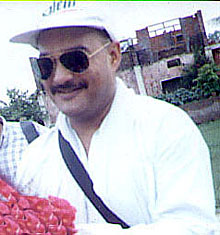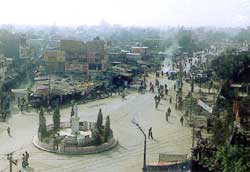Dhawal SJB Rana is Nepalganj's recently-retired mayor who hopes to contest the MP seat in November elections from the UML. Nepalganj is the political and economic hub for nine districts of the mid and far western regions. It is also the entry point for tourists to Bardia, Rara, Mugu and Jumla. Nepalganj was part of a British gift of five districts to Nepal for the Ranas' support during the Indian mutiny. Today, Nepalganj is under increasing urban pressure because of people who have fled the Maoist insurgency in the hill districts to the north. Rajan Chatkuli of the Regional Media Centre in Nepalganj spoke with Dhawal SJB Rana. Excerpts:
 Rajan Chatkuli for Nepali Times: How do you react to the government's decision to dissolve local governments?
Rajan Chatkuli for Nepali Times: How do you react to the government's decision to dissolve local governments?
Dhawal SJB Rana: Local governments are the pillars of democracy, the future of democratic rule depends on the practice of the rule of law at the local level. There was the option of extending the terms of local governments but the government did not do that for political reasons, and the decision could affect the growth of democracy in Nepal. The government needs to end the present confusion soon by holding parliamentary and local government elections simultaneously.
What is the track record of the centre's dealings with local governments?
The government has only tried to exert its influence in the name of decentralisation. It was more unresponsive to those local bodies where opposition parties were in charge. In general, it was unable to be as open and accommodative as it should have been. 
How was the cooperation of other political parties at the local level?
I had the cooperation of all political parties, intellectuals and the ordinary residents, and I tried to build on that trust.
What were you able to achieve during your tenure as mayor?
We've seen more development in Nepalganj in the past five years than we had achieved in the past 30 years. There was institutionalised corruption at the municipality, which had also affected our image. I have been able to control that corruption. We have undertaken a major effort to upgrade infrastructure: shopping centres at the municipal complex and the bus park, three organised vegetable markets, improvement and conservation of the Rani Talau, and the construction of a mini zoo. Prior to this we had no source of local income; today we are moving towards being a municipality that earns its own keep.  Did your business background help?
Did your business background help?
The municipality should be run like a well-oiled business. One has the motive to serve and the other needs to make a profit by providing services or trading. We did make the municipality more efficient, more people-friendly, and we invested in human resource development.
Is it true you didn't take a salary as mayor?
After becoming mayor I announced that I would not take any salary or benefits from the job. I distributed the first year's salary to the urban destitute, and women who needed help. The rest of the money is in the bank, and I am using it to build a waiting room in front of the emergency ward of the Bheri Zonal Hospital.
Your opponents say you are too ambitious.
I am someone who hopes to be able to lead the country's development by example. I don't think that is being over-ambitious.
Is there something you wanted to do, but could not, during your term as mayor?
I wanted to raise the status of the municipality into a sub-metropolitan city. I was not able to get the support of the MPs representing us to get that done. Secondly, I was unable to manage the sewerage of this city because of budget constraints.
What now?
If the party trusts me, and the people support me, I want to continue serving the country. Presently, I have been relieved of the pressures that come with becoming mayor and because I have free time, I have taken to reading. I am also working on my PhD thesis on "Nepali Municipalities: A Mayor's Dilemma". Many colleagues and people still address me as "Mayor Sah'b" and that sometimes make me feel that I am still in charge. We, the politicians of this country, have failed by not raising ourselves above petty politics. We can still hope to reverse the failures of the past 12 years of democracy by changing the attitudes and selfishness of those in leadership positions.


